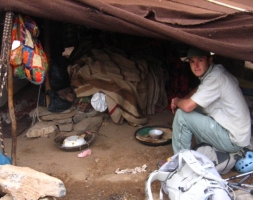Going where no student has gone before

Imperial's Exploration Board has approved challenging student expeditions for the summer - News
See also
Thursday 10 February 2011
By John-Paul Jones
From scaling uncharted Himalayan peaks to descending into undiscovered North African caves: Imperial’s Exploration Board, which supports challenging student expeditions, has given full approval this week to three more trips for the coming summer.
Up on the winding, mountain roads outside the Himalayan foothill town of Mussoorie, the journey was not turning out as planned. The student mountaineers had already come to the rescue of a lone local scooter rider, knocked off his bike by a falling tree. Now the narrow road in front had inconveniently disappeared under a landslide. More inconveniently, the road behind had met a similar fate, leaving the team trapped.
Nine hours and lots of JCB digger activity later a path through the fallen rock was cleared ahead and the Imperial explorers could push on to their destination, the Obra Valley. Here the toughest part of their journey would begin, attempting the first ever recorded ascent to the summits of three Himalayan peaks.
The adventures of last year’s student expedition to the Obra Valley are fairly standard amongst the activities supported by the College’s Exploration Board. Every year the Board reviews submissions for funding from students who are planning exploratory trips. Following their meeting last week the Board has given full approval to a variety of expeditions including mountaineering in the Reru Valley, India, trekking the Arctic in Svalbard and caving in North Africa.
Chair of the Exploration Board Dr Lorraine Craig from the Department of Earth Science and Engineering explained the principle behind the Board’s work:
“The expeditions the Exploration Board supports are not about helping students just to travel. The idea is to give groups of students the chance to explore remote and challenging environments, with the added value lying in the skills and experiences they gain over their expedition.”
She added:
“Any one of these expeditions requires a high level of logistical planning and communication, from sorting out the paper work to carrying out risk assessments, all alongside continuing to study hard. We really do feel it is a fantastic opportunity for students to test themselves and hone their skills in these areas, and transfer these skills into their studies and work afterwards.”
Jonathan Philips, a postgraduate from the Department of Materials, has first-hand experience of the organisational demands behind an expedition, having led last year’s Himalayan trip scaling 5,000m peaks. The trip itself required meticulously planning including raising funds in addition to those from the Board and planning for every eventuality, from freezing temperatures while camping on glaciers to the possibilities of altitude sickness:
“The expedition was a year in the planning, gigabytes on gigabytes of relevant materials to make sure that we were properly prepared. But it was absolutely worth it. I really do feel that these experiences enable you to get a lot more out of university life than just your academic qualification.”
Meanwhile undergraduate Clare Tan from the Department of Aeronautics is looking ahead to her caving trip to North Africa in the summer. Alongside finding new caves and passages her group has a scientific objective: to collect drip water samples in the caves to support a science research project on the North African climate.
Clare said: “There are virtually no reports of any British caving expeditions to the area, so this is very much uncharted territory and is something everyone on the team is very excited about. We are also looking forward to working closely and developing relations with local cavers and getting to know their culture a bit better.”
The Exploration Board was first established in 1955, to consider proposals for expeditions submitted by students of the College, and to administer funds to support them, provided by the College, the Union and other sources.
Over the last 55 years the Board has supported trips ranging widely across the globe, including expeditions to Borneo, Uganda, Newfoundland, Afghanistan, Norway, Australia and Nepal.
While the Board has made its selections for this year Dr Craig said it is not too early for students to begin planning for next year.
- More information on the Exploration Board
2010 Obra Valley, Himalayas slideshow
Article text (excluding photos or graphics) © Imperial College London.
Photos and graphics subject to third party copyright used with permission or © Imperial College London.
Reporter
Press Office
Communications and Public Affairs
- Email: press.office@imperial.ac.uk

